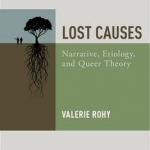Lost Causes: Narrative, Etiology, and Queer Theory
BookThis item doesn’t have any media yet
2014 | Essays
Lost Causes stages a polemical intervention in the discourse that grounds queer civil rights in etiology - that is, in the cause of homosexuality, whether choice, "recruitment," or biology. Reading etiology as a narrative form, political strategy, and hermeneutic method in American and British literature and popular culture, it argues that today's gay arguments for biological determinism accept their opponents' paranoia about what Rohy calls "homosexual reproduction"-that is, nonsexual forms of queer increase-preventing more complex ways of considering sexuality and causality. This study combines literary texts and psychoanalytic theory-two salient sources of etiological narratives in themselves - to reconsider phobic tropes of homosexual reproduction: contagion in Borrowed Time, bad influence in The Picture of Dorian Gray, trauma in The Night Watch, choice of identity in James Weldon Johnson's Autobiography of an Ex-Colored Man, and dangerous knowledge in The Well of Loneliness.
These readings draw on Lacan's notion of retroactive causality to convert the question of what causes homosexuality into a question of what homosexuality causes as the constitutive outside of a heteronormative symbolic order. Ultimately, this study shows, queer communities and queer theory must embrace formerly shaming terms - why should the increase of homosexuality be unthinkable? - while retaining the critical sense of queerness as a non-identity, a permanent negativity.
Related Items:
| Published by | Oxford University Press Inc |
| Edition | Unknown |
| ISBN | 9780199340200 |
| Language | N/A |
Images And Data Courtesy Of: Oxford University Press Inc.
This content (including text, images, videos and other media) is published and used in accordance
with Fair Use.
